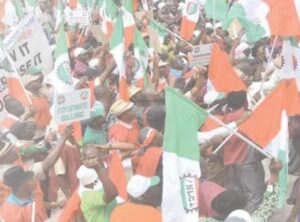NLC Criticizes New Petrol Price Hike, Accuses FG of Insensitivity
NLC Criticizes New Petrol Price Hike, Accuses FG of Insensitivity

Officials from the Nigeria Labour Congress (NLC) have condemned the recent increase in petrol prices, calling the government’s actions insensitive to the challenges facing the Nigerian public. The hike, which saw petrol prices rise to between N1,050 and N1,150 per litre, has sparked a backlash as oil marketers denied responsibility for the surge, attributing the increase to rising crude oil prices.
The Dangote Petroleum Refinery also weighed in, clarifying that the price hike was not linked to its $20 billion Lekki-based plant, but rather due to global fluctuations in the price of crude oil, which is a key ingredient in refining petroleum products.
In response, Prof. Theophilus Ndubuaku, Deputy President of the NLC Political Commission, criticized the lack of consultation with relevant stakeholders before the decision was made. He argued that in more developed nations, discussions would have been held with workers, business leaders, and student representatives to assess the potential impact and to decide on the best course of action.
He stated, “This price hike will affect not only transportation costs and food prices but will also exacerbate inflation and further devalue the naira. Instead of engaging in such a critical dialogue, we are witnessing what I term ‘Tinubunomics,’ a model that has not been tested.”
Ndubuaku also pointed out the global practice of fuel subsidies, emphasizing that even products imported into Nigeria, like those from China, often benefit from subsidies. He further lamented that the government was not prioritizing the rollout of CNG buses, a measure that could reduce dependency on petrol.
“Many promises made to the people remain unfulfilled. The government must stop this top-down approach and bring people into the decision-making process. When former leaders like Obasanjo held discussions with stakeholders, it ensured transparency and inclusivity,” Ndubuaku added.
In Lagos, Sessi Funmi, Chairperson of the NLC’s Lagos State chapter, accused oil marketers of exploiting the situation for personal gain. She labeled them “enemies of the masses,” asserting that they manipulate petrol prices for profit and undermine efforts to stabilize the domestic oil sector.
Sessi questioned the justification used by marketers, pointing out that they do not directly purchase crude oil but rather the finished product. She expressed support for the Tinubu administration’s efforts to revive the nation’s refineries, highlighting that these efforts should lead to a reduction in petrol prices, not the opposite.
“The government has done what previous administrations failed to do by restoring our refineries,” Sessi noted. “Now, marketers should not frustrate these efforts and should allow the country to benefit from these developments.”
Meanwhile, oil marketers under the Petroleum Products Retail Outlets Owners Association of Nigeria (PETROAN) reiterated that the petrol price increase was due to the rising cost of crude oil on the international market. PETROAN stressed that filling stations should not be blamed for the price adjustments, which are driven by global oil price fluctuations.
Dr. Billy Gillis-Harry, the National President of PETROAN, emphasized that petrol prices are now determined by market forces, as per the Petroleum Industry Act. He explained that both retailers and operators respond to changes in the cost of crude oil, with prices rising as a result of external factors.
“Retailers cannot be held responsible for the price hikes,” Gillis-Harry said. “We are affected by the market changes just as much as consumers. We buy at the new price and sell at the same price to avoid losses. Our selling price reflects the buying price.”
The volatility of the downstream sector, especially regarding the exchange rate and crude oil prices, was cited as a key reason for the price adjustments. Independent Petroleum Marketers Association of Nigeria (IPMAN) official Hammed Fashola also explained that competition in the market ensures that no retailer deliberately sets prices too high.
“Marketers are aware of the market dynamics. If a retailer sets a price too high, consumers will simply go elsewhere,” Fashola said. “Price changes are not made arbitrarily; they are based on the current global market situation.”
As crude oil prices remain volatile, the situation continues to impact the prices of petroleum products in Nigeria, further complicating the economic landscape. Retailers are urging the government to address these underlying factors, including the exchange rate and crude oil prices, to prevent further price instability.
TRENDING SONGS
 Shock in Anambra: Bride Disappears Moments Before Wedding
Shock in Anambra: Bride Disappears Moments Before Wedding
 Nigerian Woman Returns ₦330 Million Accidentally Credited to Her Account
Nigerian Woman Returns ₦330 Million Accidentally Credited to Her Account
 APC Don Reach Morocco?’ VeryDarkMan Reacts to Seyi Tinubu Poster
APC Don Reach Morocco?’ VeryDarkMan Reacts to Seyi Tinubu Poster
 Bride Breaks Down in Tears as Wedding Meals Were Kept Secretly While Guests Go Home Hungry
Bride Breaks Down in Tears as Wedding Meals Were Kept Secretly While Guests Go Home Hungry
 Odogwu by Day, Robber by Night: How Marriage Joy Turned Into Tragedy
Odogwu by Day, Robber by Night: How Marriage Joy Turned Into Tragedy
 Nigerian Officials Allegedly Pocket N4–6B Weekly Through Smuggling Cartels at Seme–Badagry Border
Nigerian Officials Allegedly Pocket N4–6B Weekly Through Smuggling Cartels at Seme–Badagry Border
 Ahmad Yerima: Naval Officer to Face No Sanctions After Clash with Wike – Matawalle
Ahmad Yerima: Naval Officer to Face No Sanctions After Clash with Wike – Matawalle
 Trending Video: Muslim Man Joins Wife in Hallelujah Challenge ‘Dress Like Your Miracle’ Night
Trending Video: Muslim Man Joins Wife in Hallelujah Challenge ‘Dress Like Your Miracle’ Night
 Woman Seeks Advice as Late Brother’s Wife Refuses to Mourn Him Following His Death With Alleged Mistress
Woman Seeks Advice as Late Brother’s Wife Refuses to Mourn Him Following His Death With Alleged Mistress
 Nobody Cares About Fine Girls In The UK, I Miss Nigeria — Nigerian Lady Laments
Nobody Cares About Fine Girls In The UK, I Miss Nigeria — Nigerian Lady Laments
Share this post with your friends on ![]()













